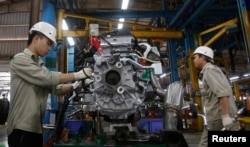Look at a list of the top four countries in Asia that could be hurt as China’s economy slows down and its ongoing trade war with the United States heats up.
Then look at a list of the top four countries in Asia that stand to benefit from these tensions and from the diversion of investment away from China.
There is only one nation that shows up on both lists: Vietnam.
Vietnam: trade war winner and loser
That is right. Vietnam would be both one of the biggest trade winners and one of the biggest trade losers, depending on how much the current disruptions to global commerce further intensify. Moody’s Investors Services has studied 23 countries all across the Asia Pacific and found that the four most likely to gain from the trade frictions are Malaysia, Taiwan, Thailand and Vietnam.
And it found that the four most likely to suffer negative consequences are Hong Kong, Mongolia, Singapore and, again, Vietnam.
That makes the trade war between China and the United States a “dao hai luoi” or a sword that cuts both ways for Vietnam.
The Southeast Asian country has been searching for a way to cash in on the conflict, selling to the Americans whatever exports are harder for them to buy from China as a result of U.S. tariffs, and vice versa.
But those benefits might be short term, whereas a protracted trade war between the planet’s two biggest economies could reduce trade around the globe overall. Analysts say that trade-reliant Vietnam needs to brace for such a scenario, and that more substantive, long-term reforms to its economy would help.
“Given the uncertain outlook for growth and trade policy, as well as generally tighter financing conditions, slower investment growth will amplify the trade slowdown, especially in Hong Kong, Singapore, Taiwan, Vietnam and Mongolia,” said Christian de Guzman, a vice president and senior credit officer at Moody’s Investors Services based in Singapore.
U.S. President Donald Trump slapped tariffs on $50 billion worth of Chinese products last summer, citing unfair trade practices from China. Beijing followed up promptly with its own retaliatory import taxes on U.S. goods. Government officials from both sides are supposed to be meeting this month to resolve the impasse, but observers are divided on the odds of an actual resolution.
Future is not bright
The trade war, combined with similar trade protectionism linked to the U.S. and spanning from Europe to Indonesia, raises the chances of economic instability globally, which does not bode well for Vietnam.
“As a small, open economy heavily dependent on external trade, an increase in protectionism and slower global trade would have significant knock-on effects for Vietnam, even if it is not the direct target of increased tariffs,” Sian Fenner, a lead economist at Oxford Economics in Singapore, wrote in a forecast. “Its dependence on foreign investor flows also makes it vulnerable to changing global sentiment.”
Real reforms needed
While Hanoi cannot do much about other state’s policies, it has faced a number of recommendations to bolster itself at home. Advisers urge Vietnam to make real reforms to its economy, taking a long view on roadblocks that leave it vulnerable to trade tensions in the long run.
For example the Vietnamese government should get serious about privatizing the plethora of state owned companies from which it has planned to divest for years, scholars Tuan Ho, Trang Thi Ngoc Nguyen, and Tho Ngoc Tran wrote in a joint report. They also suggested support for small businesses, such as through loans, and tougher screening of foreign investments to attract higher value, less polluting businesses.
An annual report on provincial competitiveness points to corruption impeding business as well. The study last month, done in part by the Vietnam Chamber of Commerce and Industry, highlights Vietnam’s two main investment centers, Ho Chi Minh City and Hanoi, as making the least progress on corruption.
One other useful reform would be to continue moving toward the status of a market economy, including by scrapping subsidies on fuel, medical services and electricity, Ho, Nguyen and Tran said. But the academics are concerned that the government is focusing less on reform and more on trade deals and stability of the currency and economy.
“This is cause for worry that Vietnamese leaders may not be paying enough attention to domestic economic reforms in their strategy,” they wrote in a journal by the ISEAS - Yusof Ishak Institute. “In other words, the trade war may actually distract these leaders from moving further towards a market economy, and may see them focusing too much only on tactical solutions to maintain macro stability and increasing exports in the short term and neglecting radical economic reform as a means to revitalize long-term growth.”






